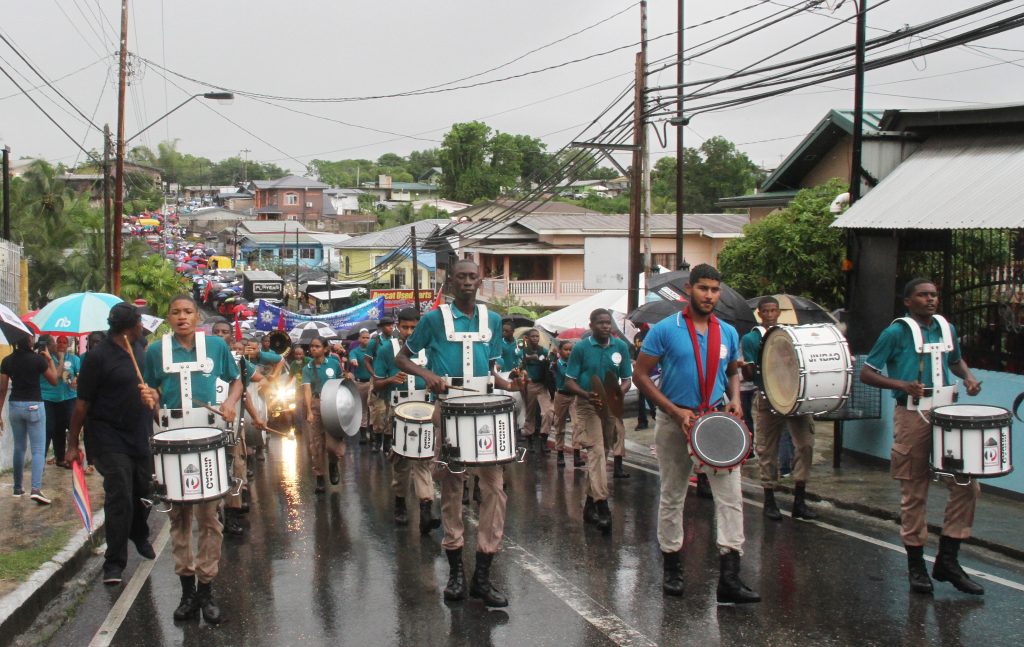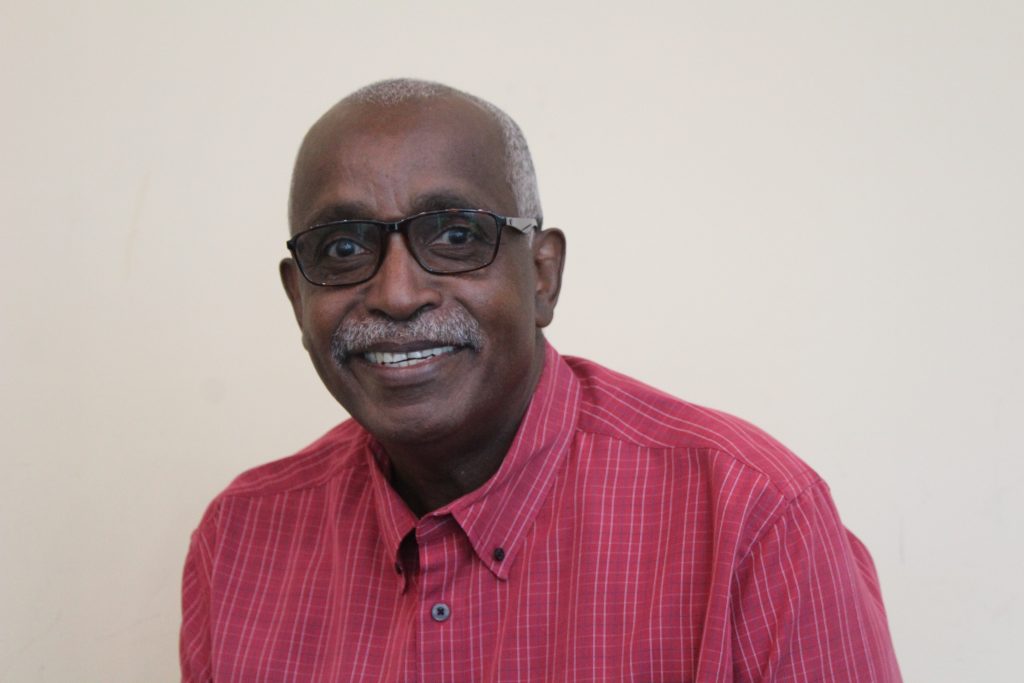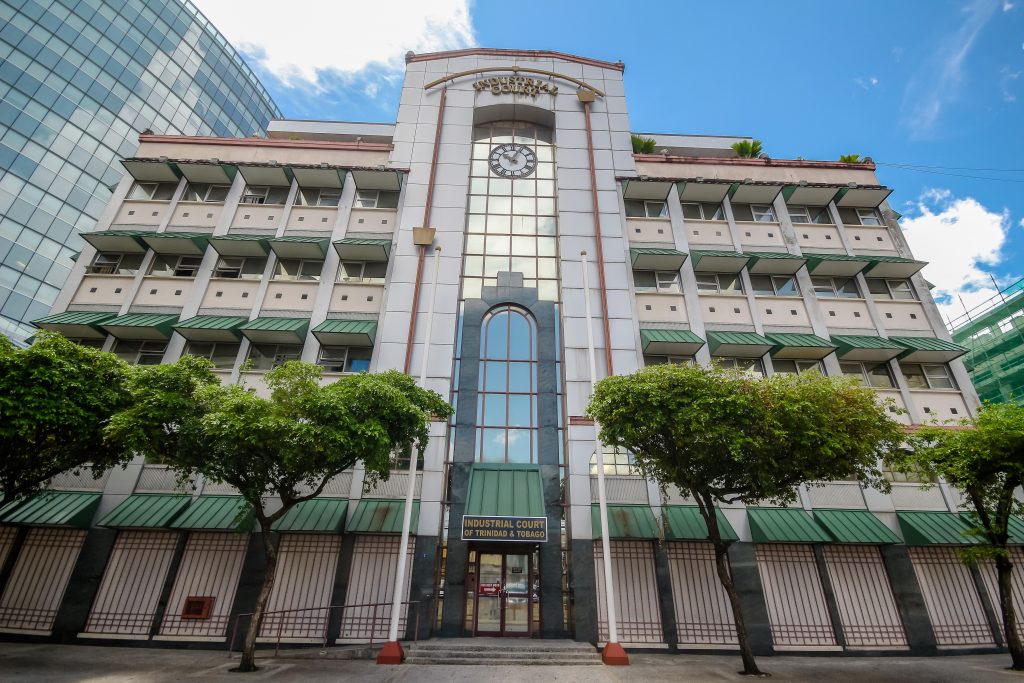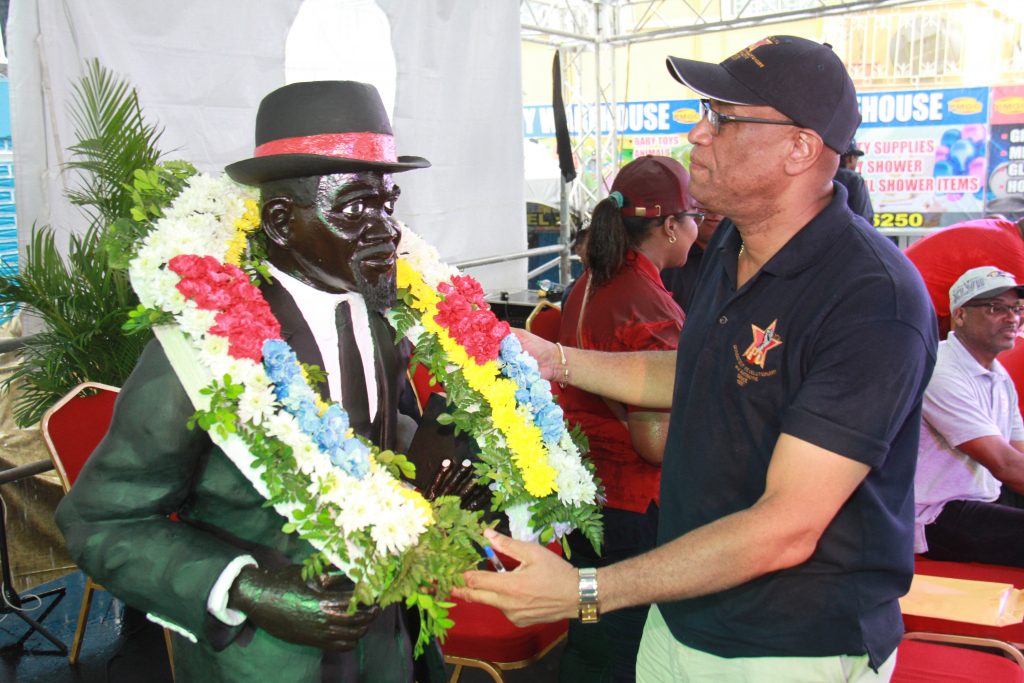Cipriani principal: Modern workers want work, not job security

Industrial relations in Trinidad and Tobago is sometimes fraught and controversial but it doesn’t have to be that way. Fundamentally, employers and workers want the same thing: a successful organisation. How to achieve that is where things can get complicated.
On the eve of Labour Day, Business Day spoke with principal of the Cipriani College of Labour and Co-Operative Studies, Dr Andre Vincent Henry, a former diplomat who represented TT at the United Nations in Geneva, Switzerland and also worked at the International Labour Organization.
He shared his thoughts about how best the country can manage friction between labour and management, the need for revising a nearly 50-year-old Industrial Relations Act, and how both trade unions and managers can best adapt to changing trends in the world of work, notable a younger workforce that is more concerned with employment security than job security and the rise of different types of work, including the gig economy.
Sometimes there's a level of condescension or smugness in the corporate world towards labour studies and industrial relations. Tell me how you view this dichotomy. How you tried to approach it in terms of bringing more of a balance and understanding to the concept of labour versus management?
Several years before I came here, I used to be a staff member at the International Labour Organization (ILO). I was actually running a programme called the Programme for the Promotion of Labour Management Co-operation or Promanco. And what we sought to do at Promanco, the one fundamental principle was that between an employer and a worker in the context of the institution, within the context of your workplace, almost invariably the interests they share in the context of that working environment are greater than the things that divide them.
The maths is very simple: if you don't have workers, you can’t produce. If you don’t have an employer, you don't have work. So both workers and employers are really joined at the hip for their mutual advancement and well-being.
What I found in my work and my research is that what people tend to focus on is not the interest that they have, or that they might diverge on but manifestations of issues.
Industrial relations in Trinidad and Tobago exists within a framework and the major part of that framework is Industrial Relations Act of 1972 (IRA). We try to get people to understand or teach people what the framework is, what are the rights and responsibilities of the various actors in that framework.
But all you can do is educate people. It is really up to the individuals – the employer (company/management) as well as the individual an institutions that represent workers. The individual (has) to understand what the implications are and to work from that perspective and to use their vision and their skill to create a better working environment.

Of course, that's a lot easier said than done because our industrial relations system is a child of slavery and indentureship. And many of the aspects of that power relation remain intact. The attitude of many employers, for example. You used to see it in some old laws that that were written years after slavery and indentureship that we refer to as master-servant relationships.
So it is really deeply ingrained. I remember, when I first started to work as a public officer in the public service, we had to sign, "I remain sir, your obedient servant." So there is a deeply ingrained cultural approach to the workplace relationship.
How do you see the friction between labour and management and how do you – and the school – seek to reconcile that?
I think you go from the objective reality. The objective reality in the words of one of my ILO colleagues, with regards to workers and employers in the Caribbean, if you don't swim together, you will drown separately. As small countries in the Caribbean, as TT, nobody's going to do anything for us. And that's becoming more and more the reality that you find.
When I first started my professional life, you found that countries were giving aid and technical assistance, preferential trade agreements – all of that is dying quickly. So in that context, there is a need in countries for the people in that country to recognise that they are tied to each other for their survival, whether you are part of the top one per cent or bottom one per cent, we are in this little boat called TT so our destinies are bound.
And covid19 has shown that, shown how vulnerable we are and the need for us to really recognise and to accept whatever autonomy we have. I think most people will agree to that.
However, you know, come to the hows: how do you operationalise that reality? How do you ensure and work to get there?
There are two contending theories or approaches. One is supply-side, trickle-down or profit-led – where you say the companies have to do well and if they do well, then the benefits will share. So the companies have to make profits. So the key is the company and the system works for the companies to make profits.
The other side is what some people call wage-led growth, where if you take care of your workers, if you pay your workers, well, you would see an increase with productivity and then everybody will rise. Because if you're trickling down, it takes a while to trickle down. And the problem is, how to how to work toward that, how to understand that and that is where our head is.
Our head (thought) that if you treat your workers well then the company will do well. That doesn't absolve workers and their representatives from having a responsibility to demonstrate leadership. And I think that's part of the problem we have.
And I might get in trouble for saying this, but when we look at the approach of people who are leaders in the trade union movement, we recognise that they still occupy a headspace that's 50 years old. And that is self-defeating in the short run and the long run because the young, educated worker – the same one who wouldn't sign a thing saying, "I remain your obedient servant," is the same one who has difficulty looking at some of the people who purport to be trade union leaders and as a consequence, will not join.
So if you look at the penetration of the trade union membership, it has fallen and it is falling further.
So it is really about change, about understanding how the environment has changed, and therefore the need for people who operate in the environment to change. And I don't think that that is happening.

How have you seen the evolution of the trade union movement in TT, from the 1930s, when it was vibrant, to now, where it’s sometimes viewed as a nuisance that wants to shut down the country? Clearly it’s more than that, but how has the image of the trade union changed among the population and perhaps contributed to its declining influence?
Now, I don't want to paint with too much of a broad brush, because there are some really exceptional trade unionists in the country. And I understand that it's a fine line to walk in any leadership position.
But for trade unions and trade unionists, many of them know they need to collaborate with or to dialogue with and engage with employers. But that can very quickly turn to accusations of selling out. And trade unionists are by definition, politicians – they are elected. And if they do something that's unpopular, you could lose the election. And it's not just about whether you lose an election.
It's also about who would come in might not have the vision to make the kind of changes necessary. Change is precarious, that’s why sometimes people just allow things to continue as they are going. And while that might be good in the short term, in the long run it can really cause damage.
So I could see two types of trade unions in the country. You have those who either aren't able to see that the environment has changed – the way work is done, the way workers have changed. Workers in TT are far more educated than they were 20, 40, 50 years ago.
Whereas you had in the old days, people were concerned about job security – they wanted to get a job, stay in the job and retire in the job to get a pension – younger workers now are more concerned about employment security. They don’t want a job for life. They want to be working. So, they have no problem switching jobs.
Even my own case, I haven't had a permanent job since I was 35. And it has worked for me.
And I think you'll find (that) more and more...because they (younger employees) are more independent and this type of work really doesn't see the benefit of a trade union. Especially if the worker compares him or herself with the trade unionist and recognises that the person can’t string a coherent sentence together or the person just wants to engage in noise, as opposed to arguments when there is no underlying philosophy, or when you have trade unionists who appear to use the trade union to advance their personal interest rather than the interests of the members.
How do you see trade unions then, adapting to the modern worker?
I think there are many aspects of it. We tend to believe, my colleagues in the Labour Studies Department, that trade unionists have a responsibility for all working people, not just members of
unions. So I think they need to widen the scope of what they do. So it's not just negotiating terms and conditions, not just negotiating a salary increase.
It is better understanding what the challenge is for the modern worker and how the trade union movement can add value to the modern worker. Because every working person requires protection. Given the nature of work, workers are becoming far more vulnerable to exploitation.
I think trade unions also have to expand their economic base, because being dependent only on dues from members (isn't sustainable).
So you see more and more trade unions getting involved or trying to get involved in commercial activity as a way of providing employment but also equipping themselves to take care of working people. You see it, for example, in the OWTU’s attempt to take over the former Petrotrin refinery. You have a number of trade unions getting into things like housing. I know the general secretary of NATUC, Michael Annisette – he's also a member of the board here – he's been working assiduously to try to create a workers’ consumer co-operative that would allow working people to have access to consumables at a better price.
So you need to do more things that put you in the public eye as having a vision, because young people have vision. They have their views. And their views are not tainted with all the baggage that (people like me) carry from growing up in a colonial society.
On the flip side, how then does management or HR... also adapt?
Well, I run Cipriani, not the Lok Jack (Global School of Business).
But the scripture says, without a vision the people perish. And I think that is lacking on both sides, the concept of a vision, interpreting an environment. Because it all comes down to understanding what are the constraints and what are the autonomies that you have within the environment and working to minimising those constraints and maximising the opportunities that you have. And you can’t do that by doing knee-jerk things.

So, just for the layman, what is industrial relations and human resources? And why is there such a big chasm between them when they seem to be trying to achieve the same thing?
Oh no. You tell any one of my lecturers here who do labour studies that IR and HR are the same…no. They are related and good IR leads to good HR management and vice versa.
HR is more concerned with leveraging the human capital of employees for the benefit of the firm in which the worker is a variable.
IR is more concerned about the right of workers.
But by themselves, HR specialists wouldn’t do that. I think it's a question of perspective.
You always hear businesses in TT say the Industrial Court, for example, is too much in favour of workers and that the Industrial Act needs reform…
Workers will tell you and trade unions will tell you the IRA needs reform.
So the question then, is two parts: how do you view the industrial relations climate in TT right now, and within that, the whole tripartite organisation with labour, business and government?
All right. So, given my background, and experience in the International Labour Organization, I’ll answer the second part first.
Social dialogue, which is what you're supposed to get out of that tripartite interaction, is core. It goes back to the first point I raised: our common interests are greater than our divergent interests. It is only though social dialogue, not just in crisis, but especially outside of crisis, where people get to understand where the other person's headspace is, what their thinking is, what their interests are, what their concerns are, what their fears are. That creates a good foundation for good industrial relations.
So I am a firm advocate of tripartite dialogue. It's not something that's easy. And sometimes we look for easy answers when the thing is more complicated. I might approach it differently.
In terms of the industrial relations climate, I think things will get worse.
Because if something isn't as strong as it is, and it is not – the reason why we know it's not as strong as it is, because government, labour and employers all agree that the IRA should be revised. That might be the one thing everybody agrees on.
So now you have declining oil prices, you have covid19, you have the changes that have already taken place in the system, the rise of the gig economy, non- standard forms of employment, increase in contract work – all these things. So this system is going to be placed under more stress. So you're going to find yourself almost building on a weak foundation.
This system might have been good for when the Industrial Stabilisation Act was passed in 1965 and it might have been good when the Industrial Relations Act was passed in 1972. That’s almost 50 years ago, and in that context, you lay the foundation for a wooden house and you’re putting all sorts of concrete structures on top of it.
Friday is Labour Day: what is your view or your hope for industrial relations in Trinidad and Tobago?
I’m an old man and an eternal optimist. It’s part of my religious beliefs. I believe that this country has a reservoir of goodwill and sometimes we need a good crisis to find our better selves.
So back when we had the first recession in the early 1980s, TT used that crisis to really retool its manufacturing sector and we came out of that stronger than when we went in. That’s part of why we were the manufacturing dynamo of the Caribbean for many years.
I think the current issue with the decline in oil prices, covid19 – (we have) the capacity to step up to a challenge because we stepped up to a challenge (before) – it’s not because we’re stupid.
I am hopeful that as things get tight, people will come to the realisation that hey, it’s sink or swim and we will choose to swim instead of sink.
About Cipriani College of Labour
For 54 years, the Cipriani College of Labour and Co-operative Studies has been the leading resource for teaching and researching labour and industrial relations in TT. It’s one of the oldest tertiary institutions in TT, part of late Prime Minister Dr Eric Williams’ vision for educating the people, with a special role for the labour movement in contributing to the economic, social and political development of the country.
The school was named after Captain Arthur Andrew Cipriani, one of the early advocates for the TT labour movement – a white officer in the West India Regiment – who eventually became a politician, labour leader, self-governance advocate and the founder of the Trinidad Workingmen’s Association, later the Trinidad Labour Party.
The school offers six programmes: labour and co-operative studies, human resource management, project management, occupational safety and health, and emergency and security administration and management. It offers a range of options – nesting programmes – that allow seamless transition from an introductory “10-Saturday” session, to certificate, diploma, associate degree and bachelor’s degree programmes. Most of its students are mid-career, over the age of 30 and primarily part time.


Comments
"Cipriani principal: Modern workers want work, not job security"